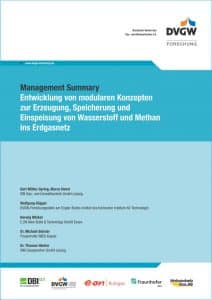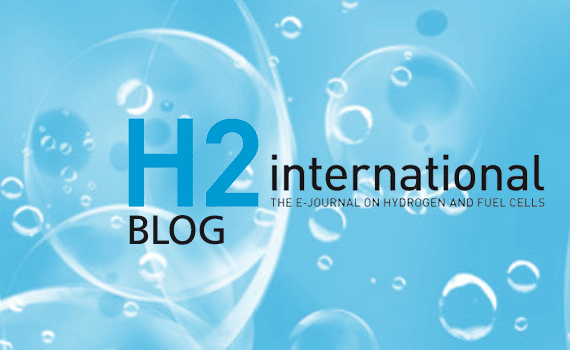 Renewably sourced hydrogen has recently gained considerable importance in several economic sectors at once. The automotive and fuel industry sees it primarily as a way to power fuel cell vehicles, whereas its main use in the natural gas industry is for grid feed-in. The diversity of applications means that different industries will employ different technological and economic strategies for utilizing hydrogen. To compare strategies and examine the combined utilization potential, the National Organization Hydrogen and Fuel Cell Technology (NOW) and the German Technical and Scientific Association for Gas and Water (DVGW) decided to join forces and commission a study on the joint use of hydrogen as fuel and grid supply.
Renewably sourced hydrogen has recently gained considerable importance in several economic sectors at once. The automotive and fuel industry sees it primarily as a way to power fuel cell vehicles, whereas its main use in the natural gas industry is for grid feed-in. The diversity of applications means that different industries will employ different technological and economic strategies for utilizing hydrogen. To compare strategies and examine the combined utilization potential, the National Organization Hydrogen and Fuel Cell Technology (NOW) and the German Technical and Scientific Association for Gas and Water (DVGW) decided to join forces and commission a study on the joint use of hydrogen as fuel and grid supply.
The “Meta-Study to Examine the Potentials of Hydrogen for the Integration of the Transportation and Energy Economy” combines the results from the two studies “Integration of Wind-Hydrogen Systems in the Energy System” by NOW [1] and “Modular Designs to Create, Store and Feed In Hydrogen and Methane Into the Natural Gas Grid” by the DVGW [2]. The NOW study examined large-scale wind-hydrogen systems and evaluated the potential of hydrogen as fuel supply for FC vehicles and the sale of electricity for grid balancing. The DVGW study focused on hydrogen feed-in into the gas grid and the fuel’s subsequent use in stationary applications. Both studies include comprehensive analyses on technological and economical aspects.
The first part (1) of the meta-study assesses and validates the core statements of the studies on which it was based and integrates those into newly devised “value chains” or the production and sales opportunities of renewable hydrogen (2). These value chains go far beyond the few options mentioned in the source papers and are its key contribution. Above all, the combination of value chains in the meta-study makes it possible to explore and quantify efficiency gains, something which had not been attempted before. The authors of the meta-study also take a look at the research and development demand that had been estimated and compare it to current and completed R&D projects (3). Based on these comparisons, they go on to suggest designs for future demonstration projects (4).
Two studies compared
The comparison (1) analyzes the issues examined in both papers: technological components, investment and operational cost of hydrogen supply, and market prices. In principle, there are indeed differences between individual hydrogen markets and production methods, and both studies include a number of distinct plant designs. For example, the DVGW paper examined several power-to-gas plants with an electrolysis capacity of up to 144 MWel, whereas the NOW authors focused on only one wind-hydrogen system with a capacity of 500 MWel. Both studies additionally explored a variety of technological and economic variants, of which merely a portion are compatible with each other. Nevertheless, the comparison has shown that there are significant agreements of technological, cost and price aspects. One of these similarities is the – crucial – specific investment cost of electrolysis. This means that we have a reliable data set available to design new value chains.
…
To determine and quantify synergy effects, the value chain analysis creates combined-use scenarios. These scenarios combine more than one individual use case to create different options, with a main value chain describing the principal market for hydrogen and other subordinate chains to complement it. For instance, the Industry scenario primarily creates hydrogen for chemical processes, but also supplies fuel cell vehicles and feed-in into the natural gas grid. Transportation’s overriding aim is to supply the fuel market, but hydrogen is offered for natural gas mixtures as well. The Gas Grid scenario is used mainly for hydrogen feed-in, but includes some supply for transportation. These, however, are only the most important scenarios; there are many more shown in the study.
Immense cost-cutting potential
The combined-use scenario Industry cuts the cost of producing electricity from hydrogen by seven euro cents compared to the stand-alone version and brings total cost down to EUR 7.47 per kg of H2; Transportation cost is reduced by EUR 3.60 to EUR 8.05 per kg of H2 and the Gas Grid scenario will cut it by 1.54 euro cents to EUR cent 19.44 per kWh of H2. The combination of different value chains has driven down costs in transportation by an impressive 34 percent and brought it much closer to the fossil fuel figure.
…
Need for R&D / Outlook
The meta-study also compares the development and research demand …
The meta-study was conducted by research institute DBI Gas- und Umwelttechnik, with contributions by planning and consulting firm MW-quadrat. NOW and DVGW funded the study with EUR 20,000 (net value) each; the data it contains is from mid-2015.
References …
Authors:
Dr. Oliver Ehret, NOW, Oliver.Ehret@now-gmbh.de
Gert Müller-Syring, Marco Henel, Anja Wehling, all from DBI Gas- und Umwelttechnik
Martin Weiße, MW-quadrat



























0 Comments
Trackbacks/Pingbacks